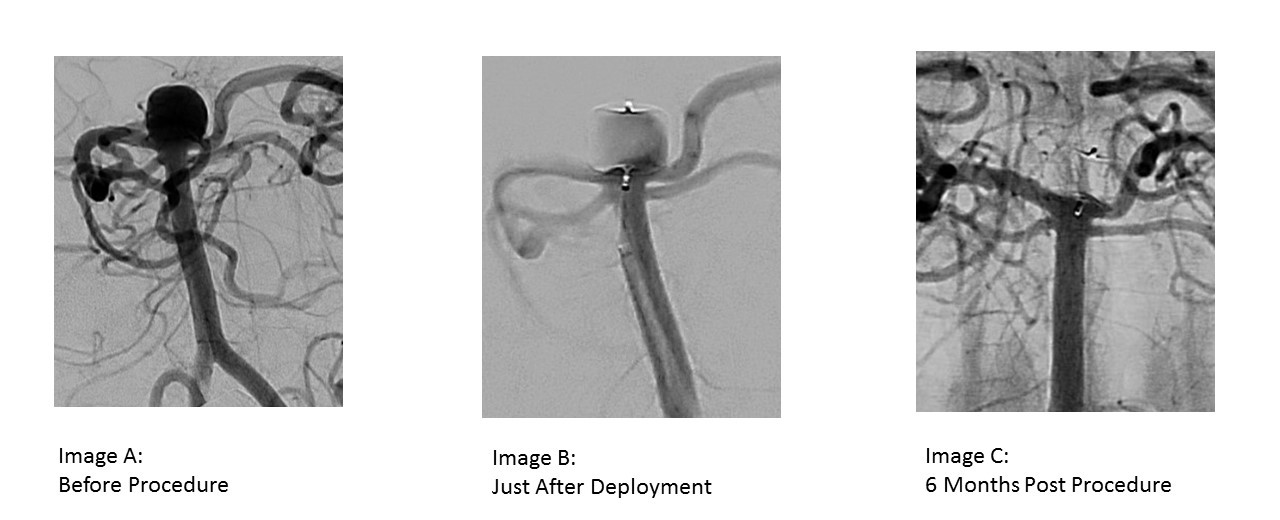New endovascular device helps patients avoid risks of open surgery and months of antiplatelet medication
A generally healthy and active 62-year-old woman presenting with intermittent double and blurry vision was referred to Emory Neurosurgery by her neurologist when it was discovered she had a wide-necked basilar apex aneurysm of significant size. The patient was seen by the neurosurgery team at the Emory Brain Health Center to determine treatment approaches for the 10 mm aneurysm.
As one of the most dangerous locations to have an aneurysm, the basilar tip artery has a high risk of bleeding, and is very challenging to treat with open surgery. The Emory team felt that an endovascular approach using coils and stents was not ideal, particularly for a wide-necked aneurysm in this location.
After the team discussed several options with the patient, she opted for an endovascular procedure using the WEB® Aneurysm Embolization System. A novel device approved in early 2019 for use in the United States, WEB offers several significant advantages to both a coil and stent endovascular technique and a craniotomy with surgical clip ligation.
The Procedure
For Emory Brain Health Center’s neuroendovascular team – consisting of neurosurgeons, neuroradiologists, vascular neurologists and neurointensivists, along with radiology technicians, PAs, APRNs, and RNs – this procedure was at the same time familiar and brand new. While they would use familiar endovascular techniques, their patient would be the first in the state of Georgia and the Southeast to to receive a WEB device that would eventually eliminate the aneurysm from her brain circulation.

The device looks like a tiny, flexible mesh pillow and comes in multiple shapes and sizes. Physicians choose the proper shape and size to fit the aneurysm’s dimensions. This is a distinct advantage over using coils and stents, which do not allow for a near-custom fit and don’t work well in some types of aneurysms.
After accessing the patient’s femoral artery at her groin, and with X-ray guidance, physicians guided a catheter into her brain to the area of the aneurysm, and deployed the WEB, moving it carefully into place inside the aneurysm, where it expanded to fit snugly inside. It then acted as an intravascular flow diverter, cutting off the flow of blood to the aneurysm. The entire procedure took less than 15 minutes, and the patient was sent to neurological intensive care to be monitored overnight. She had no complications from the procedure and could walk out of the hospital the next morning. At her six-month follow-up, her angiogram showed the aneurysm was gone and her normal blood vessels remained intact.

WEB® Aneurysm Embolization at Emory
Emory Healthcare is the only hospital in Georgia and the Southeast to offer WEB for aneurysm endovascular treatment. While the device has been in use in various formulations in Europe for several years, its approval for use in the United States is recent, and requires rigorous training and multiple proctored surgeries for trainees. Emory’s substantial commitment of time and training means patients have access to a safer, quicker treatment for brain aneurysms, particularly the wide-neck bifurcation type. Often, treating this type of aneurysm means open surgery; and microsurgical approaches using coil and stent devices, require months of dual antiplatelet therapy. WEB offers patients another safe option to treat brain aneurysms.
For more information about Emory Neurosurgery or to refer a patient, call 404-778-5050 or visit
emoryhealthcare.org/referpatient.
Emory Brain Health Center is committed to the continued health and safety of all patients. During this time, we are taking all necessary precautions to screen for COVID-19 and to prevent its potential spread. We continue to monitor the evolving COVID-19 situation and are working with experts throughout Emory Healthcare to keep your patients safe. For the most up-to-date information for our referring partners, click here.
